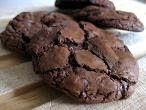
I said a few weeks ago that I was never going to make another scone - I had found scone perfection in Nigella's recipe, and that that was it forever. But I wanted to test it alongside a recipe by Nigel Slater, who is another food writer I like very much. I had cut out a recipe from Sainsbury's Magazine last year, and with a willing band of tasters presenting themselves I made a quick batch for The Scientist's latest gaming trip. I didn't have any eggs so I subbed 1 Tbsp plain yogurt. And I also added dried fruit which Nigel doesn't. The scones were perfectly lovely, and even caused The Scientist's gaming friends to run out for jam and cream. Nigella they were not, however. I am told that they lacked the same light fluffiness - though without the comparison they would have done very well. I hate to make it sound as though I am being critical of one of Nigel's recipes, after all.

So, do make these. They are very nice scones. However, if you want to wow your friends, relatives and partner's cricket team, make these.
Nigel Slater's scones (Sainsbury's magazine, October 2008)
Nigel says that these are the first scones he'd made without plain flour and baking powder - they use self raising flour instead.
Makes 6 or 7 small scones
250g self raising flour, plus extra for dusting
40g cold unsalted butter
25g golden unrefined caster sugar
1 large egg (or 1 Tbsp plain yogurt)
about 150ml buttermilk, or 120ml normal milk with 2 Tbsp natural yogurt
handful of dried fruit (optional and not part of Nigel's original!)
a little egg and milk for glaze (optional)
Preheat the oven to 220C/fan 200C, Gas 7.
Sift the flour into the bowl of a food processor with a pinch of salt [he 'genuinely recommends' sieving the flour here]. Add the butter, cut into small pieces, and then the sugar. Blitz for a few seconds, until you have what looks like breadcrumbs. Break the egg into a mixing jug, whisk lightly, then pour in enough buttermilk to make the quantity up to 150ml. Pour the liquid into the food processor bowl and blitz very briefly. Turn the mixture onto a floured surface and knead gently for a few seconds, just until you can pull the mixture together into a ball.
Pat the dough into a large round, about 2.5 cm thick. Cut out as many scones as you can using a 5-6cm cookie cutter or upturned glass. Bring the trimmings together and press gently back into shape, then cut out a couple more until you have used up all the mixture.
Place on a baking sheet, brush with the beaten egg and milk to glaze, if using. Bake for 12-15 minutes till pale and risen. Serve slightly warm with clotted cream and jam.



2 comments:
I see a great research project in this - you should try lemonade scones if you want another scone to try - I blogged about them last year and they were superb
I heard it was to be 30 degrees in london today and laughed - but I remember the heat is different in the uk and the buildings don't cope well - but I hope it is not as bad as the shopping centre in melb where people flocked on a 43 degree day this year and the air con wasn't working :-)
These sound wonderful. I have made several scone recipes and am always on the lookout for new ones to try. I like that you added dried fruit.
Post a Comment